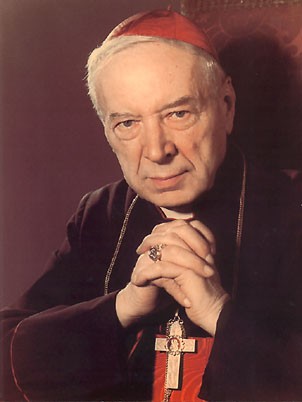Documents reveal how Polish Cardinal helped Jewish families escape Holocaust

Cardinal Wyszyński, the Polish national hero who resisted its Communist rulers and was imprisoned for his faith, secretly helped Jews during the Nazi Holocaust in the Second World War.
The revelation, says the Zenit news sevice, comes from documents gathered at the Yad Vashem memorial in Jerusalem containing eye-witness accounts of his actions.
Wyszyński was involved in ministry to Polish resistance fighters against the Germans and from 1941-42 was based at a centre for aid to blind people. According to Jadwiga Karwowska, whose parents worked at the centre, he helped a Jewish family of three, a father and two of his children.
She recalled: "Fr Wyszyński came to us constantly, literally each night, and we hid them [the Jewish family] at our attic. He helped my dad put a ladder and take it back to the garden so that there were no traces of anybody's presence at the attic." They were aware that the family were Jews and of the danger of their actions.
Another Yad Vashem testimony, from Esther Grinberg (Morgenstern) reveals other previously unknown, facts about Wyszyński. Born in 1918 in Międzyrzec Podlaski, Grindberg lost her parents, brother, and sister in the Holocaust. She arrived in Warsaw during the ghetto uprising in 1943. In her memoirs she refers twice to the fact that Wyszyński was well known for encouraging his congregation to help all those who were escaping from the war. She says that for safety reasons he did not say exactly whom to help, but that it was known he meant Jews who were fleeing the ghetto.
As head of the Catholic Church in Poland, Wyszyński attempted to reach a degree of accommodation with the Communist authorities in the face of their vicious persecution of the Church. However, in 1953 he issued a letter with the title "Non possumus", "We cannot go any further", refusing any further concessions. It was an act of defiance that led to his arrest and imprisonment for three years, during which he witnessed the brutal torture and ill-treatment of prisoners.
When Pope John Paul II was elected he sent a message to Poles referring to Wyszyński saying: "There would be no Polish Pope on this Chair of St Peter [...] if it was not for your faith undiminished by prison and suffering, and your heroic hope."
Wyszyński supported the revolutionary Solidarity movement but called on both sides to show restraint. His funeral in 1981 was attended by around 500,000 people.











